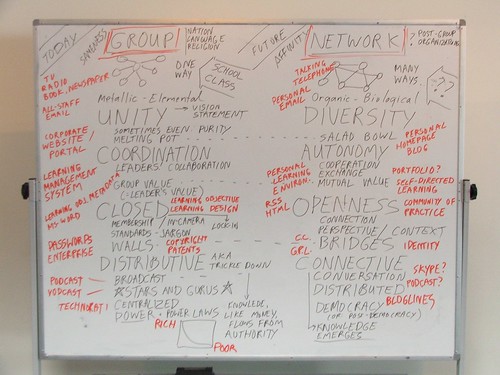In preparation for CCK08’s Week 5 (yeah, I did some reading again, finally 🙂 ), I read Stephen Downes’ transcribed presentation on “Groups vs Networks: The Class Struggle Continues“. He makes compelling distinctions between groups and networks and uses old metaphors that I know from my English and North American Cultural Studies classes.
Groups – groups are defined by their unity. In fact, one of the first things you do in a group is you try to maintain its unity. A group need to be, in some sense, cohesive, united, “e pluribus unum”. Or to keep this politically fair, “The people united will never be defeated,” the “melting pot”, the encouragement to be the same, the encouragement to have the same values, to follow the same vision, to be, in some relevant way, like the others because that’s what the group is. (Downes, 2006, ¶40)

Networks, on the other hand, are salad bowls:
In Canada, we were all taught, is a salad bowl where each entity, the lettuce, the tomato, the whatever, cucumber, I don’t know what you put in salads. That’s what we put in salads. All of these things maintain their distinctness and their identity and by maintaining their distinctness and identity, they create a whole that is something distinct and different from any individual entity and indeed, something that cannot be created without maintaining that distinctness and identity.
[…] And so there is this idea of the network, there is this idea of distinctness and diversity in an environment where people are encouraged not to be the same, but to be different. (Downes, 2006, ¶46-47)

These two metaphors provide me with a very clear distinction between these two concepts that help to keep them apart. Stephen’s tabular comparison between groups and networks is of additional help to get some characteristics straightened out.

This distinction had me already wondering before when the terms “group” and “network” were used in CCK08. Finally, the week has arrived where these issues will be addressed closely. 🙂
Do we have groups in our course or subnetworks?
In presentations and the synchronous sessions, there has been a lot of talk about groups within CCK08. Are they true groups taking Stephen’s characteristics from his eFest presentation into consideration or are they something else? The only argument indicating to “group” is that some aspects of CCK08 are closed at first glance: you must be a member of Facebook, LinkedIn, Twine, Diigo, Google Groups, Second Life etc. to have access to unofficial parts of CCK08 that were created in these services. However, membership in these groups is open to anyone who wants to identify with CCK08. We are free to come, join, contribute, and leave. Some other avenues are entirely open: the course blog, the course wiki, the course Moodle (though you have to sign in when you want to contribute), the Google map, the blog posts, Twitter messages.
The “groups” within CCK08, at least as far as I perceive them, are not coordinated or dominated by one person, but everybody can contribute equally and bring in her/ his points of view. Usually, there is a person who sets up a certain service, e.g. the Facebook group, the Twine etc., but that does not mean that this person dictates the direction of the discussion or the (correct) use during the course. To speak in the salad bowl metaphor: This person just provides the bowl in which all ingredients can mix happily.
Then, is such an arrangement still a group? I had feared that this discussion might have already happened as Week 3 already dealt with network properties. However, searching the Moodle forums, I only came up with one reference for “subnetwork”, but the discussion centers on something else. As I do not have an overview of all blog posts, I may be missing reflections and / or discussions that have been going on there about this topic.
Looking at Stephen’s comparison, I think, we form subnetworks within our CCK08 network and not groups. Thus, do we use the term “group” only in a very wide everyday sense of something like “people gathering together to accomplish something” (leaving out all other aspects like leadership, prescribed values, centralization etc.)?
![]() This work is licensed under a Creative Commons Attribution-ShareAlike 4.0 International License.
This work is licensed under a Creative Commons Attribution-ShareAlike 4.0 International License.
whenever my sister makes potato salad, i always eat them in less than a minute or so he he. i just love all sorts of salad. ‘.~
Thanks for a different terrific report. Where different could anybody get that form of data in such a excellent way of composing? I’ve got a presentation up coming week, and that i am around the search for these types of information.